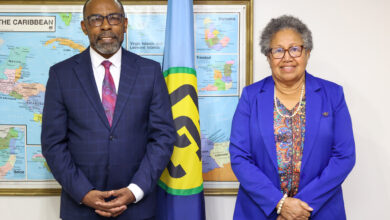(CARICOM Secretariat, Turkeyen, Greater Georgetown, Guyana) European Trade Commissioner Peter Mandelson told Caribbean leaders that the region and the Economic Partnership Agreement (EPA), with the European Union (EU), had the potential to be models for putting trade at the service of development and showing the world that the Caribbean states are 21st century development and economic leaders.
Mr Mandelson was addressing the Special Meeting of Heads of State and Government of Caribbean countries that are signatories to the African Caribbean and Pacific Group (ACP)-EU Cotonou Partnership Agreement in Montego Bay, Jamaica on Thursday evening.
The meeting between CARIFORUM Heads of State/Government and Mr Mandelson and his colleague Commissioner for Development and Humanitarian Aid, Mr Luis Michel has been called to try and resolve issues which could delay the completion of the negotiations for the EPA in keeping with an agreed schedule. Previously, exports from Caribbean and other ACP countries have enjoyed non-reciprocal preferential access into the European Union under successive Lomé Conventions and the current Cotonou Partnership Agreement. The non-reciprocal arrangements come to an end on 31 December this year.
Mr Mandelson said the EPAs were “the way to help create a modern, 21st century business environment, attract foreign direct investment, to grow markets and trade in order to reduce poverty.”
“I want the Caribbean ACP to be in a position to grow your economies by growing your regional markets and your trade. That’s why regional integration is key – without it, growth in markets in services, investment and public procurement will be held back – and why progressive liberalization of trade as the driver of that integration is so important,” he added.
Mr Mandelson said the aim was to put trade at the service of development, “genuinely harnessing new trade flows to your economic growth.” He said that was what was needed to be done to conclude the EPA the outline of which could be put in place at the meeting.




